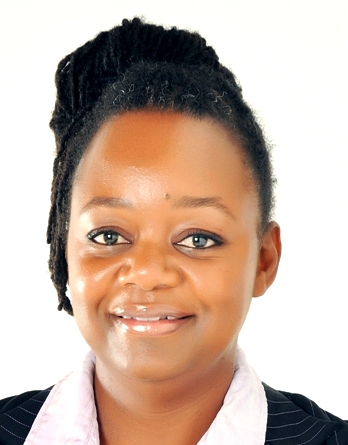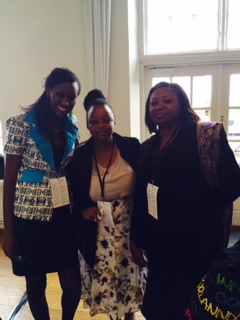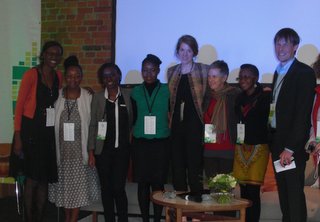Interview of the Month
Dorothy Okello is also a Senior Lecturer with the Department of Electrical and Computer Engineering at the College of Engineering, Design, Art and Technology (CEDAT) - Makerere University, Kampala, Uganda. She has over 15 years experience in teaching, researching, and in conducting projects and contributing to policies in the ICT sector at national and international levels. Dr. Okello holds a B.Sc. in Engineering (Electrical - First Class Hons.) from Makerere University, Uganda, an M.Sc. in Electrical Engineering from the University of Kansas, United States (Fulbright Scholar), and a Ph.D. in Electrical Engineering from McGill University, Montreal, Canada (Canadian Commonwealth Scholarship Recipient). Dr. Okello's research at the university focuses on accessible and affordable Internet – and within the department, Dr. Okello initiated the Community Wireless Resource Centre (CWRC) in 2006 with an objective of research focused on solutions to address the provision and enhancement of sustainable Internet connectivity infrastructure, particularly in rural or underserved areas in Uganda, by means of wireless technology.
In addition, Dr. Okello has served as a Commissioner with Uganda Communications Commission (UCC), where she also served as Chairperson for the Rural Communications Development Fund (RCDF) that is administered by UCC. The overall objective of RCDF is to enable equitable access to and effective utilisation of innovative communication-enabled services that support the attainment of Uganda's development goals (for all people, especially those in rural and other underserved areas, both male and female). Beyond Uganda, Dr. Okello has also contributed on ICT and Gender gender issues at regional and international level with organizations including East African Community (EAC), Research ICT Africa, GSMA mWomen and GSMA Global Media Awards, Stockholm Internet Forum, and UN Economic Commission for Africa (UNECA). Dr. Okello is recipient of a number of awards and recognitions as a result of her work in the ICT sector. In 2010, Dr. Okello was recognized as 'Top ICT Woman – Uganda ICT Excellence Awards 2009'. Organised by the Uganda ICT Forum, the Awards recognized selected organizations, institutions and individuals whose use of ICT exhibited exceptional achievement in Uganda.
In addition, Dr. Okello was among five individuals recognized by the NEPAD Planning and Coordinating Agency (NPCA) at the CTA Week 2010 for their contributions in various fields of science and technology. She was also recognised among the Top 10 Personalities that have shaped Uganda's ICT in 2011 by Uganda's PC Tech Magazine. She was featured as one of 12 Top Technology People in East Africa who are technologists with a social twist – individuals in East Africa who are using technology for social change, and the greater good by Enterprise Technology Magazine, September 2012. As part of the celebrations to mark Uganda@50, Dr. Okello received the Women Achievers Award 2012 for outstanding contribution in enhancing women's empowerment through Science and Technology on account of her work with WOUGNET. Organised by Uganda Women Parliamentarians Association (UWOPA) and Uganda Women's Network (UWONET), the Women Achievers Awards presided over by H.E. Yoweri Kaguta Museveni, the President of Uganda, recognised Excellence, Empowering, Creativity/Innovativeness and Role models/Exemplary. In November 2013, selected as first recipient of Africa's first Digital Woman Award at the ICT Days in Cameroon. 2014 Class of the VVLead Fellowship Program. Accepted as 2014 Vital Voices Fellow for distinguished emerging and established women leaders who provide unusual and sustainable solutions to pressing problems that have impeded women and girls' progress to participate fully in society and the economy.
She speaks to MEWC about her engagement for women empowerment. Founder and director of WOUGNET (Women of Uganda Network), she advocates and takes action for using ICTs as a major driver in transforming the lives of all Ugandans, both male and female.

MEWC: Dr. Okelllo, you hold a PhD degree in electrical engineering and you are now Director of Wougnet. How did WOUGNET come into being?
DO: For eighteen months prior to the formation of WOUGNET in May 2000, I maintained an email mailing list through which women's organisations in Uganda would share news and announcements, as well as tips on computer and Internet usage. As interest in the list grew, it became apparent that structures and mechanisms were needed to maintain and facilitate this communication. Consultations were held with several well-known women's organisations, and there was clear need for:
- a list that would facilitate exchange of ideas and information between women's organisations;
- a companion website that would profile women's organisations and use the web to provide additional exposure for their activities; and
- information and support on how to maximise the potential of ICTs within women's organisations.
In response to the above, the WOUGNET mailing list and website were set up. The WOUGNET website and mailing lists were hosted by Kabissa - Space for Change in Africa. By the end of 2000, the WOUGNET mailing list had fifty subscribers, including 18 women's organisations, while the website profiled 25 women's organisations and women-related projects.
MEWC: What were the motivating factors for establishing the network and engage with issues of women empowerment and action?
DO: As noted above, consultations were held with several well-known women's organisations at the time, and there was clear need for:
- a list that would facilitate exchange of ideas and information between women's organisations;
- a companion website that would profile women's organisations and use the web to provide additional exposure for their activities; and
- information and support on how to maximise the potential of ICTs within women's organisations.
MEWC: According to you, use of ICT is crucial for women empowerment. For instance, how women can use ICT to support them in their projects? What concrete impact could it have for women in rural areas? Can you elaborate more by highlighting some concrete example from WOUGNET?
DO: The use of ICT is not only crucial for women empowerment, it is key tool successful inclusion by all of us in this global world. To quote some statistics from the 2013 Broadband Commission Report on "Doubling Digital Opportunities. Enhancing the Inclusion of Women & Girls In the Information Society":
- By 2015, it is estimated that 90% of formal employment across all sectors will require ICT skills
- Globally, women are 21% less likely to own a mobile phone than men
- 200 million fewer women than men are online, and the gap could grow to 350 million within the next three years if action is not taken
- In sub-Saharan Africa, it is estimated that only half the number of women are using ICT compared with men
Women can make use of ICTs in a variety of ways which I can broadly classify into three categories: information and networking, administration, and productivity. Women can use ICTs to be better informed for the decisions they have to make in their personal, family and work lives. They can also use ICTs to facilitate networking locally, regionally and internationally. They can use ICTs to acquire new skills or to enhance/diversify existing knowledge and skills. For example, since 2013, WOUGNET has partnered with the Cherie Blair Foundation for Women to provide e-mentoring opportunities for women in business - [http://wougnet.org/2014/07/cherie-blair-e-mentoring-team-from-uk-visits-uganda-women-micro-entreprenuers/]. WOUGNET also hosts email, web and social media platforms to facilitate interaction among women and women organisations in Uganda. In July 2014, the Hon. Janet Kataha Museveni, First Lady of Uganda officially launched the Women Public Administrators (wopubadmin) online platform that was established on request by ACFODE to facilitate dialogues among women administrators in Uganda - [https://dgroups.org/hivos/wougnet/wopubadmin]. In this case, WOUGNET is providing technical support for administration of the platform.
Women can also use ICTs to enhance administration of their various projects. For example, the processes of gathering, processing and dissemination of project information can all be greatly enhanced through the use of ICTs. Women can readily share information about their projects, for example, annual reports, documentaries of their project activities, etc., using ICTs. Evaluations and feedback can also be gathered using ICTs including online, radio call back
programs, and mobile phones. For example, WOUGNET has used a YouTube video to share work about an ICT and Governance project - [url]. We have also used ICTs to obtain nominations of participants for the Start Your Own Business (SIYB) program - [url]. Mobile money has been the success it has been due to the ease and minimal time with which one can distribute funds and make payments - http://pctechmag.com/2014/07/mobile-money-accounts-out-numbering-bank-accounts-in-9-african-counties/
Lastly, women can make use of ICTs to enhance their productivity. For example, projects addressing farmers can use ICTs to share information on weather, good farming practices, new opportunities as well as market access and prices - [url - Moses e-agric story]. Projects on governance can use ICTs to amplify grassroot voices. For example, WOUGNET and ToroDev are using Ushahidi to enabling reporting on service delivery by local communities - [http://www.wougnet.org/ushahidi/; http://indigotrust.org.uk/tag/wougnet/]. In the area of health, alerts can be send out via SMS and radio for updates on disease outbreaks, reminders for health centre visits or reminders for medication, etc.
Depending on the availability of ICT infrastructure, affordability as well as access to energy supplies, one does need to be careful to select ICTs that appropriate for a given context - rural or urban. For example, the uptake of e-mentoring program has been primarily in urban areas where there is better connectivity, while mobile phone platforms and radio have been found to be more applicable in rural areas.
Doroty Okello with panel members at the Stockholm Internet Forum 2014
MEWC: Do you think this emphasis on use of ICT and similar technologies can produce a clash with the traditional ways of doing things? What challenges, if any, did such an initiative pose?
DO: The use of ICT and similar technologies can produce a clash with traditional ways of doing things - but one that can be managed. For example, e-learning can be used to enable more study hours for the female child even while at home but does not address the stereotype that girls do not need to be educated - where such is the belief.
Also, ICTs greatly enhance the timeliness and opportunity for access to information which information may have previously been only available to designated heads whose responsibility it was to disseminate it on a "need-to-know" basis and/or in ways that maintain power relations in a community.
This illustrates that promotion of ICTs and similar technologies needs to go hand-in-hand with awareness and sensitisation campaigns on not only the expected individual benefits but the benefits to the family and the community at large. Otherwise, ICT/technologies may be rejected as being disruptive to the traditional/cultural ways of doing things before the ICT/technologies are given a chance to demonstrate how they can support or enhance traditional ways.
MEWC: You obtained a bachelor degree in Uganda, a master degree in United States and a PhD degree in Canada. Did your international education play a key role in your vision of what women's empowerment should look like?
DO: I was fortunate to have been nurtured in the women's movement in Uganda as I completed my undergraduate degree. At the time, this was as a member with the Association of Women Engineers, Technicians and Scientists in Uganda (WETSU). My study abroad also revealed the disparity between the number of males and females in science and technology. By the time I became an active member of the APC Africa Women network that was part of the Association for Progressive Communications (APC) Women's Networking Support Program, it was very clear that women's empowerment was not only a Uganda issue but an international issue too.
MEWC: In 2012, you won the award for your distinguished service in empowering women and girls through Science and Technology. Does this milestone help you deliver the message and implement actions better? In what way and scope has the network expanded in the recent years?
DO: The award that I won in 2012 and others since have greatly motivated me in the drive to empower women and girls through science and technology. More importantly, the awards help garner further recognition of the work still pending to be done by myself but all those in the drive for women's empowerment.
MEWC: Given the current political scenario, how would you view both the women's movement in Uganda and the process of nation building? Are the two mutually interdependent in any way?
DO: The women's movement in Uganda is very vibrant and has garnered successes in various sectors over the years including in the political arena. Ugandan women have also been instrumental in the process of nation building and we do have some notable women including having had a female Vice President and currently our Speaker of Parliament is female - Hon. Rebecca Kadaga.
MEWC: What are the barriers to getting more women in science and technology programs in universities?
DO: There are indeed a number of barriers including:
- cultural and financial barriers that keep girls away from school. For example, cultural barriers may include gender stereotyping that depicts science and technology as being for male students.
- poor development of science and technology curricular in ways that attract the interests of both girls and boys.
- notable absence of female students and teachers/lecturers in science and technology.
- very few female leaders and role models that have senior leadership positions in universities, particularly in the science and technology programs.
- limited support programs to enable women persist in their careers in science and technology.
For example, due to limited state of the art science and technology llaboratories, one may need to travel abroad and yet may have family responsibilities to attend to as well. Even without the travel abroad, challenges with day care support may constrain how much time women may be available to commit towards their careers and the better option may seemingly be to opt out for a more flexible work-life option.

MEWC: What are your plans for the future?
DO: Certainly to continue to promote the use of ICTs for the empowerment of girls and women. In addition, I would like to nurture others, particularly those in the fields of science and technology, to join in promoting the empowerment through science and technology.
MEWC: What is the Uganda you aspire for? What is the Africa you want?
DO: One in which one's potential can be fully exploited, whether female or male, and one in which science and technology is a major driver in transforming the lives of all Ugandans, Africans - both male and female.
WOUGNET's Contacts:
Website: http://wougnet.com
Twitter: @wougnet
Facebook: https://www.facebook.com/wougnet?fref=ts
Linkedin: http://ug.linkedin.com/in/dorothyokello
Address: Plot 55 Kenneth Dale, Kamwokya
Postal: P.O.Box 4411 Kampala, Uganda
Email: This email address is being protected from spambots. You need JavaScript enabled to view it.,This email address is being protected from spambots. You need JavaScript enabled to view it.This email address is being protected from spambots. You need JavaScript enabled to view it.
Tel: +256 414 532 035

